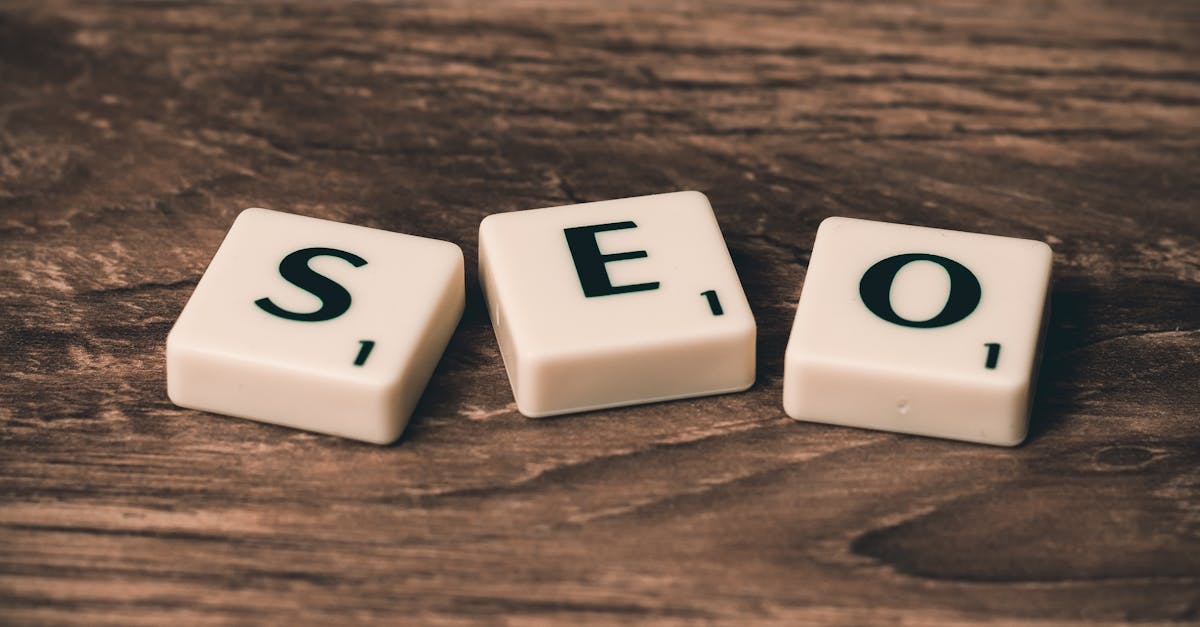
Table Of Contents
Local SEO
Local Search Engine Optimization (SEO) focuses on enhancing online visibility for businesses that operate on a local scale. It involves strategies aimed at attracting nearby customers who are actively searching for products or services in their vicinity. Local SEO techniques often include optimising online listings, ensuring accurate business information, and enhancing customer engagement through online reviews. These efforts are crucial for small and medium-sized enterprises looking to compete effectively against larger entities in their local market.
To maximise the potential of Local SEO, businesses can leverage tools like Google My Business. This platform allows owners to manage their online presence across Google, including search and maps. By ensuring that their business profile is fully optimised with correct details, images, and customer interaction features, businesses can significantly improve their chances of being discovered by local consumers. This targeted approach not only drives foot traffic but also fosters community relationships, making it an essential component of any local marketing strategy.
Google My Business Optimisation
Optimising your Google My Business (GMB) listing is crucial for local SEO. When businesses claim and verify their GMB profiles, they can provide accurate information about their services, hours of operation, and location. This not only enhances visibility in local search results but also builds trust with potential customers. Completing all sections of the profile, including business categories and attributes, can significantly improve the chances of appearing in local pack results, giving businesses a competitive advantage in their area.
Engaging with customers through GMB also plays a vital role in enhancing Search Engine Optimization (SEO). Responding to reviews, uploading high-quality images, and posting updates keep the listing dynamic and informative. Furthermore, regular interactions signal to Google that the business is active, which can positively influence rankings. By leveraging GMB effectively, businesses can attract more foot traffic and boost conversions, ultimately driving growth within their local market.
Ecommerce SEO
E-commerce SEO focuses on enhancing the visibility of online stores in search engine results. Effective strategies are crucial for attracting potential customers looking for products relevant to their needs. Optimising product descriptions, using high-quality images, and ensuring fast loading times are foundational steps in this process. Implementing structured data markup can also help search engines better understand product information, which aids in displaying rich snippets in search results.
To maximise sales, e-commerce websites should prioritise keyword research tailored to their specific products. Identifying long-tail keywords often leads to higher conversion rates as they capture more targeted search intent. Additionally, leveraging user reviews and ratings not only builds trust but also contributes to better rankings in search results. Search Engine Optimization (SEO) serves as a powerful tool that helps e-commerce businesses establish a solid online presence and drive traffic.
Product Page Optimisation Techniques
When it comes to e-commerce, product page optimisation techniques play a crucial role in enhancing visibility and attracting potential customers. The first step involves creating compelling and accurate product descriptions that incorporate relevant keywords. This ensures that search engines can effectively index your pages, making them more likely to appear in search results. High-quality images and videos also contribute significantly to user engagement, enabling customers to visualise the product better. Implementing reviews and ratings can further bolster a product page’s credibility and encourage conversions.
Another vital aspect of product page optimisation is the use of structured data, which helps search engines better understand the content of your pages. Implementing schema markup for your products allows search engines to display rich snippets, which can improve click-through rates. Additionally, ensuring a seamless user experience through mobile responsiveness and fast loading times is essential. All these techniques work synergistically to enhance Search Engine Optimization (SEO) efforts, ultimately driving traffic and increasing sales for your online store.
International SEO
International SEO is crucial for businesses aiming to expand their reach beyond local markets. It focuses on optimising websites to attract global audiences and drive international traffic. Different countries have different search engines, languages, and cultural preferences. Adapting SEO strategies to these factors ensures content resonates with target audiences in various regions.
A key aspect of international SEO is creating multilingual websites that cater to diverse linguistic groups. This involves not just translating content but also understanding regional colloquialisms and cultural nuances. Properly structured URLs, hreflang tags, and localised keywords enhance visibility in search results. Effective Search Engine Optimization (SEO) facilitates connections with users across borders, helping brands expand their global footprint.
Multilingual Websites and Regional Targeting
Multilingual websites play a crucial role in reaching diverse audiences across different linguistic backgrounds. When businesses expand their operations internationally, adapting content to various languages becomes essential for effective communication. Crafting a website that caters to multiple languages allows companies to connect with users in their native tongue, fostering trust and engagement. This approach also enhances visibility in search engine results, ensuring that potential customers can find relevant information in their preferred language.
Regional targeting complements multilingual strategies by focusing on specific geographic markets. By considering cultural nuances and local search behaviours, businesses can tailor their SEO efforts to resonate with audiences in particular regions. Implementing region-specific keywords and localised content not only improves search visibility but also drives traffic that is more likely to convert. For successful Search Engine Optimization (SEO), understanding the unique needs and preferences of each target market is key to creating a compelling online presence.
FAQS
What is SEO?
SEO, or Search Engine Optimisation, is the process of enhancing a website's visibility on search engines to attract organic traffic. This involves optimising various elements of the website, such as content, structure, and technical aspects, to improve its ranking in search engine results pages.
What are the different types of SEO?
The main types of SEO include Local SEO, E-commerce SEO, and International SEO. Each type focuses on specific strategies tailored to different audiences and goals, such as attracting nearby customers, boosting online sales, or targeting global markets.
How does Local SEO differ from other types of SEO?
Local SEO focuses on optimising a business's online presence to attract customers from specific geographic areas. This includes tactics like Google My Business optimisation, local keywords, and citations, which help businesses appear in local search results.
What are some effective techniques for E-commerce SEO?
Effective techniques for E-commerce SEO include optimising product pages with relevant keywords, ensuring high-quality product images, using detailed product descriptions, and implementing structured data to improve visibility on search engines.
Why is International SEO important for businesses?
International SEO is crucial for businesses looking to expand their reach beyond their home country. It helps in targeting global audiences by optimising websites for different languages and regions, thus enhancing visibility and accessibility for international customers.

















































